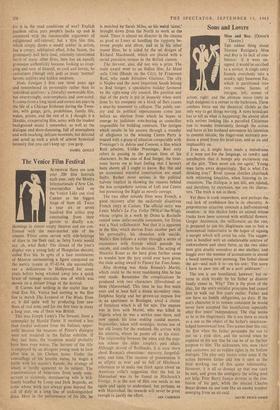Sons and Lovers
THE oddest thing about Terence Rattigan's Man and Boy is its lack of con- fidence: if it were un- signed, it would be ascribed to a novice. A single entry funnels everybody into a musky, ugly basement flat, which is partitioned into two rooms.' Scenes of intrigue, left; scenes of action, right; and the ultimate move (only in high dudgeon) is a retreat to the bathroom. These confines force out the t,heatrical cliches as the only way to get things moving. A news broadcast has to tell us what is happening; the almost idiot wife arrives looking like a parodied Christmas tree to wander irrelevantly through the, action and leave as her husband announces his intention to commit suicide; the finger-man secretary pro- duces a pistol from his brief-case, and so on and implausibly on.
Even so, it might have made a melodrama if it were not 'for the language, so tawdry and unreflective that it bumps any excitement out of the plot. `Then, never ask me again.' Young man turns away despairingly. 'But is what I'm thinking true?' Rival tycoon clutches chairback with whitening knuckles, when listening to in- sinuations. The dialogue is not felt, not related, and therefore, by extension, nor are the charac-. ters. The truth is not in them.'
Yet there is truth somewhere, and perhaps the real lack of confidence lies in its obscurity. A. preposterous situation conceals a half-conceived emotion: in this thicket lurks an animal whose; tracks have been covered with artificial flowers. Gregor Antonescu, the, millionaire on the run, is prepared to use. his illegitimate son to bait 'a homosexual industrialist in the hopes of signing a merger which will avoid his ruin. The sugges- tion is handled with an unbelievable mixture of awkwardness and sheer farce, as the two older men grin double entendres at one another, and haggle over the number of accountants to attend a board meeting next morning. The father closes the act—and such it is—on his son: 'I'm sorry I have to pass you off as a petit pederaste.'
The son is not humiliated, however, but re- turns to stick loyally by his father as disaster finally closes in. Why? This is the pivot of the play, for the son's socialist principles had caused him to walk out five years earlier, Father and son have no family obligations, no duty. If the son's character is to remain consistent he would never have accepted this humiliation, especially after five years' independence. The clue seems to be in the illegitimacy. He is not there so much as a son as the object of the father's unacknow- ledged homosexual love. Two scenes bear this out, the first when the father persuades the son to put On a pink shirt, and the second when he explains to his' son that he can be of no further purpose to him. The nicknames, too, mon cheri and carissimo, act as sudden lights in the hollow dialogue. The play only makes some sense if the action between father and son is seen as the final working out of this queer relationship. However, it is all so dressed up that one can't be sure, and given the ambiguity the acting does not help. Poor Barry Justice drowns in the con- fusion of his part, while the miscast Charles Boyer drones on one tone like an enemy bomber emerging from an air-raid.
DAVID PRYCE-JONES






























 Previous page
Previous page